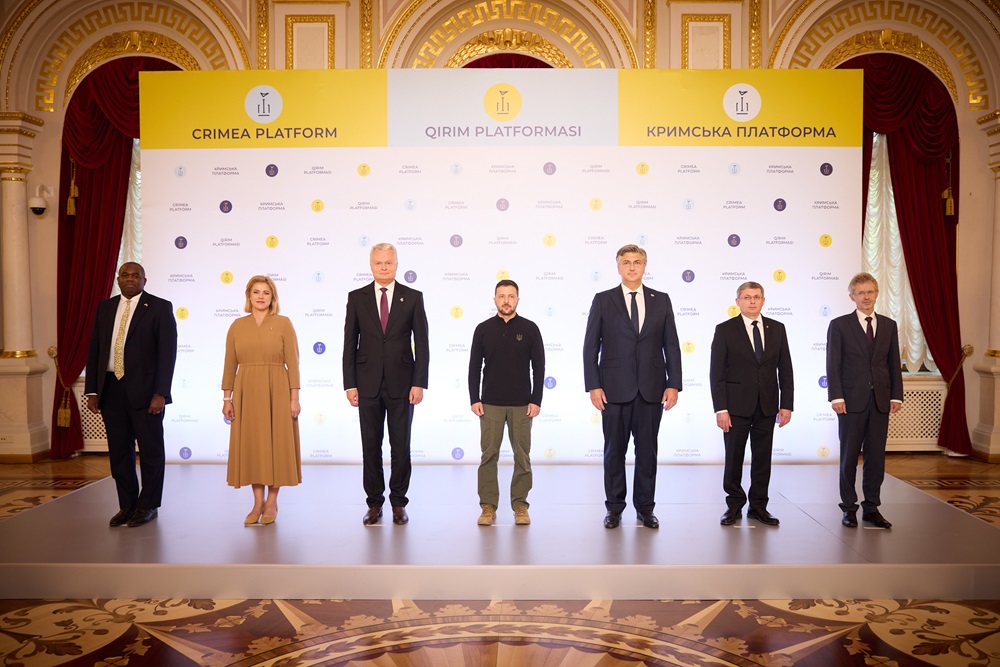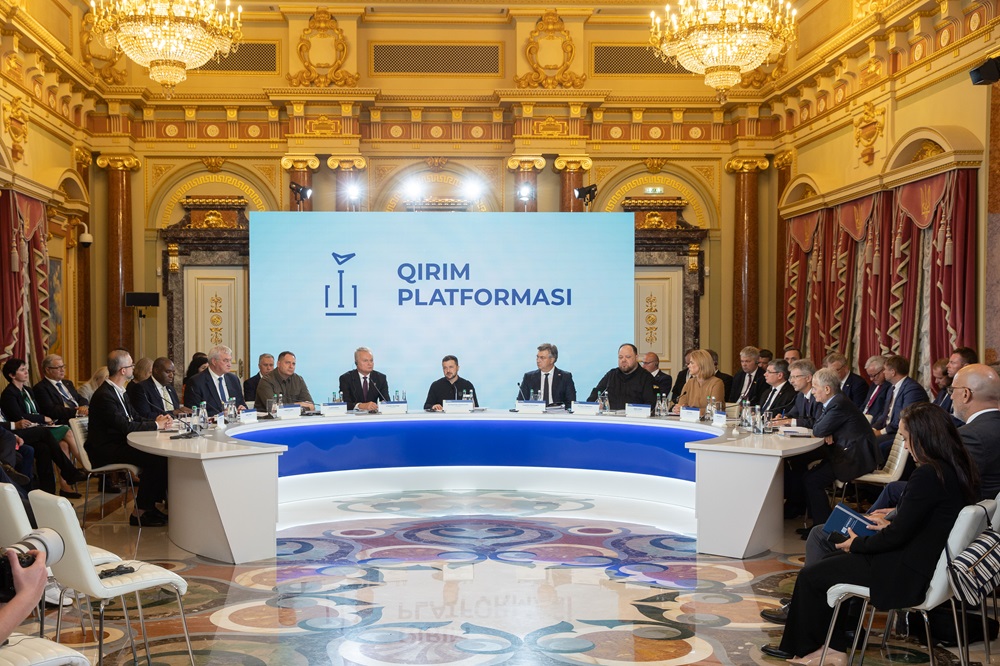Hosted the Fourth Summit of the Crimea Platform
On September 11, Kyiv hosted the Fourth Summit of the Crimea Platform. This year, the summit brought together more than 60 representatives of different countries and international organizations to discuss the problems in occupied Crimea and accelerate the de-occupation of the peninsula. The Office of the President of Ukraine, the Mission of the President of Ukraine in the Autonomous Republic of Crimea, the Ministry of Foreign Affairs of Ukraine and other partners were actively involved in organizing the Summit.

It is vital that this year, the geographic variety of participation of countries and international organizations has extended. For the first time, Argentina, the Black Sea Economic Cooperation Organization, and the International Religious Freedom or Belief Alliance participated in the governmental format of the Crimea Platform.
The summit was attended by the President of Lithuania, the Prime Ministers of Latvia and Croatia, the Chairmen of the Parliaments of Moldova and the Czech Republic, the Secretary of State for Foreign Affairs of the United Kingdom, the Secretary of State of the United States, the heads of the Black Sea Economic Cooperation Organization, and other participants. Many foreign government officials joined the discussion online and via video.
“Thanks to the Crimea Platform, thanks to diplomatic efforts, thanks to the resistance of our people, our soldiers, we are clearly forcing Russia to face reality, namely international law, the power of global solidarity, and the need to restore full justice for Ukraine and, ultimately, a lasting peace for our entire land and all our people,” President of Ukraine Volodymyr Zelenskyy emphasized in his speech at the summit.
Participants emphasized their unwavering support for Ukraine and its efforts to liberate all territories. The summit was held in the framework of thematic blocks related to the de-occupation and reintegration of the Crimean Peninsula in the context of the mandatory element of the implementation of the Ukrainian Peace Formula, the success of the Security and Defense Forces of Ukraine in the Black Sea. Attention was also paid to the 80th anniversary of the deportation-genocide of the Crimean Tatar people, the human rights situation in occupied Crimea, and the importance of releasing civilian hostages as one of the priorities of the President of Ukraine and the implementation of the Peace Formula.

During the summit, the Ukrainian Institute presented a cultural program that immersed the participants in the history of resistance to the occupation and the consequences of Russian aggression. The art exhibition consisted of three components:
Lomykamin: Women's Resistance in Crimea is an exhibition showcasing women's resistance in Crimea for an international audience. The exhibition focuses on the portrayal of women in the context of occupied Crimea. It highlights how women overcome the challenges of living under occupation and demonstrate their fight for rights and freedoms.
A mini-exhibition of objects from the War Childhood Museum is called Ukraine Behind the Porthole. The exhibition promotes a deeper understanding of the occupation and its consequences for the occupied communities through a quiet and sensitive contemplation of children's stories during the war.
Qarşılıq / Resistance 2.0 is an exhibition of objects from the military, originally from Crimea, and from Indigenous peoples of Ukraine who continue to resist. For most people, these objects may seem relatively mundane, but each has a deep symbolic meaning and connects the heroes of the exhibition to their native Crimea.
Following the Summit, the participants adopted a Joint Statement in which, among other things, they emphasized their unwavering commitment to restoring Ukraine's sovereignty and territorial integrity, including the de-occupation of Crimea, by continuing to provide Ukraine with comprehensive political, financial, and military assistance in countering Russian aggression.
It is worth mentioning that the Fourth Summit of the Crimea Platform featured some crucial events, including the unveiling of the Memorial to the Victims of the Crimean Tatar Genocide in Kyiv. The opening ceremony was attended by President of Ukraine Volodymyr Zelenskyy and First Lady Olena Zelenska. They were joined by President of Lithuania Gitanas Nausėda, Prime Minister of Croatia Andrej Plenković, Prime Minister of Latvia Evika Silinia, Chairman of the Senate of the Czech Parliament Miloš Vystrčil, Chairman of the Parliament of Moldova Igor Grosu, Prime Minister of Ukraine Denys Shmyhal, Chairman of the Verkhovna Rada Ruslan Stefanchuk, Head of the Office of the President Andriy Yermak, Permanent Representative Tamila Tasheva, leader of the Crimean Tatar people Mustafa Dzhemilev, government officials, ambassadors, military, representatives of the Crimean Tatar people and the public.
During the Fourth Summit of the Crimea Platform, Lithuanian President Gitanas Nausėda presented the Grand Cross of the Order of Vytautas the Great to First Lady of Ukraine Olena Zelenska. She was honored with this award for her contribution to the struggle for freedom, sovereignty, and territorial integrity of Ukraine and for her services in developing interstate relations between Lithuania and Ukraine.
The Summit participants also visited the exhibition of “Scythian Gold,” transported at the end of 2023 from Amsterdam, where it was stored after the occupation of Crimea by Russia.
In addition, the Fourth Summit of the Crimea Platform included a side event, during which a panel discussion “Crimea and the Peace Formula. The Humanitarian Aspect”. The event was organized by the Mission and Expert Network of the Crimea Platform in partnership with the Crimean Human Rights Group and the ZMINA Human Rights Center.
As a reminder, the Crimea Platform is an international advisory and coordination mechanism initiated by President of Ukraine Volodymyr Zelenskyy, whose goal is to de-occupy the Crimean Peninsula. The activities of the international platform, in particular, the Crimea Platform Office, are aimed at improving the effectiveness of the global response to the occupation of Crimea, increasing international pressure on the Kremlin, preventing further human rights violations, and protecting the victims of the occupation regime. The Crimea Platform reminds and asserts that it was the occupation of Crimea that began the Russian invasion of Ukraine 10 years ago, and only with the de-occupation and reintegration of Crimea can the war be ended.